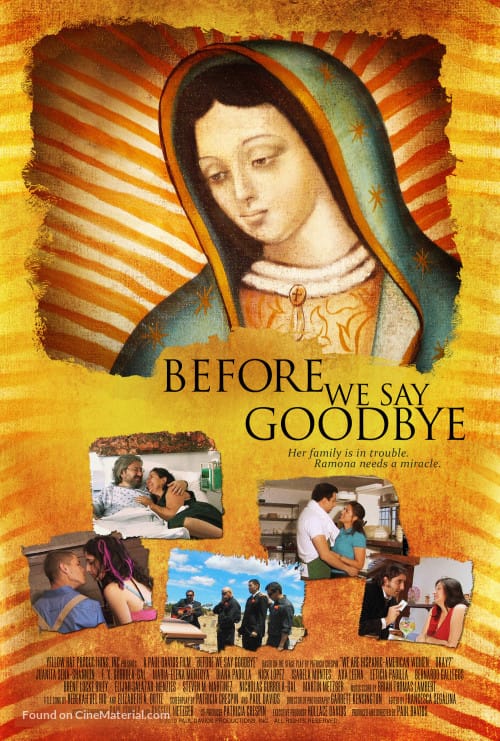Faith Manifest in “Before We Say Goodbye”

“Before We Say Goodbye” (2010), Directed by Paul Davids, written by Davids and Patricia Crespin, filmed primarily in Albuquerque and northern New Mexico and Mexico.
Ramona Garcia is the matriarch of a Hispano family living in modern-day Albuquerque. Her family includes parents, a husband, four grown children and their children, each of whom have their own particular crisis. The problems they face both embody Ramona’s traditions and faith and threaten to destroy them. Some are comical (one child prefers Taco Bell to the home cooking at the family restaurant), others are serious such as the angst-ridden questionings concerning God. Her husband is the glue that holds everything together but Carlos is dying, and Ramona fears for the future of her family.
Relying on her faith, she decides to travel to the Basilica of the Virgin of Guadalupe in Mexico City to ask for a miracle. It is the type of journey made by millions across the world that are rarely successful but revelatory in how they bring a new perspective to what is going on in the place they left. The title alludes to the immediacy of coming to grips before someone passes. Faced with death on this plane and after a lifetime of anticipating an eternal hereafter, everyday problems often come fully into focus, leaving the bonds that tie a family together either tightened or undone.
Ramona’s unconditional support and love for her family becomes her strength, even as some of those family members make it difficult for her to care. This is the underlying dilemma of the film, allowing “Before We Say Goodbye” to transcend a particular culture. It is not the future of a belief system for others that is important; it is what one draws on from the past that makes us strong. That Ramona prays to the Virgin of Guadalupe, a symbol of a mother’s unconditional love that she knows and believes, is the basis of the thread that weaves these people together and is the key to bringing this family together in times of their individual and collective bad times.
As such, this is not a religious film, but one of affirmation in the discovery of one’s personal strength.
The movie has an indie feel. Based on the play “We Are Hispanic-Women…OK?” by Crespin, who was graduated from New Mexico Highlands University and the University of New Mexico, it is not as polished as some Hollywood blockbusters, but its quiet intensity punctuated by real-life humorous situations makes it worth watching alone, or, better yet, with a large, dysfunctional family.